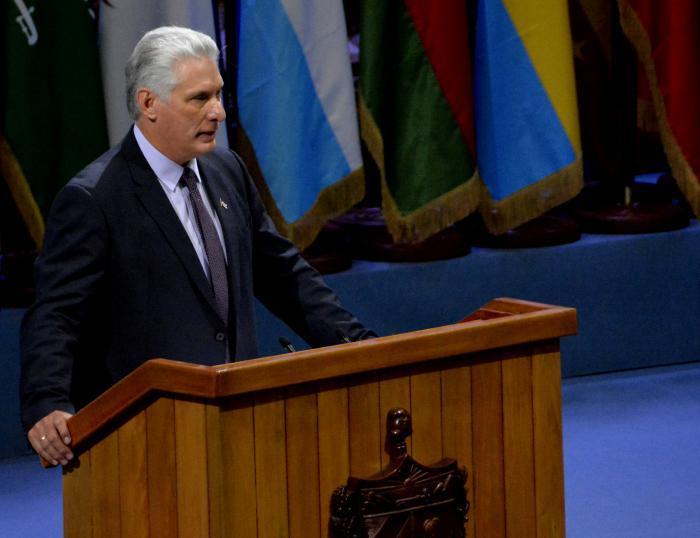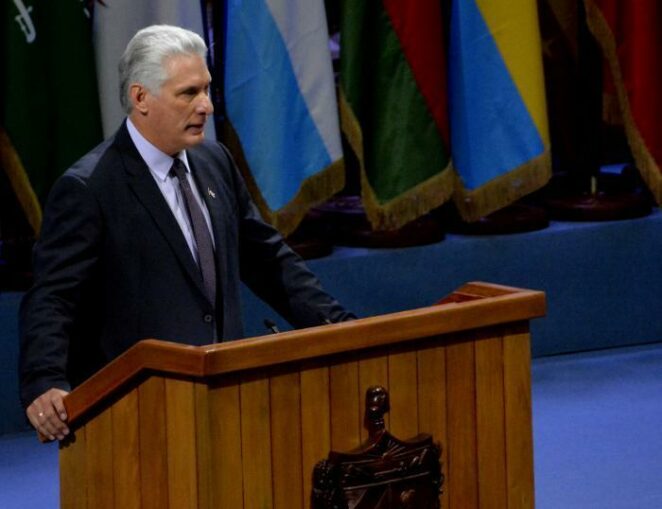

Cuban President Díaz-Canel addressing G77 plus China summit in Havana, Cuba, Sept. 14, 2023.


Cuban President Díaz-Canel addressing G77 plus China summit in Havana, Cuba, Sept. 14, 2023.
The inaugural session of the Summit of Heads of State and Government of the Group of 77 plus China was held in Havana, Cuba, Sept. 14 to 16. Established in 1964, the G77 now has 134 members, with a rotating chair alternating among member countries from Asia, Africa, the Middle East, Latin America and the Caribbean.
It is the largest intergovernmental organization of developing countries, with two-thirds of the U.N. member states, and accounts for 80% of the world’s population. Although China is not an official member, it consistently supports the G77 positions and demands.
Mexico, a founding G77 member which withdrew from the alliance in 1994, rejoined this year.
This year’s summit specifically addressed “current development challenges: the role of science, technology and innovation,” tackling “core” development issues. The summit was held in Cuba this year, and President of the Republic of Cuba Miguel Díaz-Canel Bermúdez addressed the opening session, which was attended by U.N. Secretary Antonio Guterres.
Díaz-Canel opened his remarks by addressing the six-decade U.S. imperialist blockade of Cuba and “all the problems that go with that siege, which has recently been intensified.” He addressed “the immense challenges generated by the prevailing unjust international order,” noting, “but we are not alone.”
He called for dismantling. now, the “international barriers that have obstructed access by the developing countries. … This summit occurs at a time when humanity has reached unimaginable scientific-technical potential. This has an extraordinary capacity to generate wealth and well-being that, under conditions of greater equality, equity and justice, could ensure decent, comfortable and sustainable living standards for almost all the inhabitants of the planet.
“Considering the length of time during which the North has adapted the world to suit its interests, at everyone else’s expense, the moment has arrived for the South to change the rules of the game.
“‘It’s the hour of the furnaces, in which all there is to see is light,’ José Martí would say. With the rights we — the vast majority of the Group of 77 members — acquire by being the primary victims of the world’s present multidimensional crisis; of the cyclical imbalances in international trade and finance; of the abusive, unequal exchange; of the science, technology and knowledge gap; of the danger stemming from progressive destruction and exhaustion of the natural resources on which life on earth depends, we demand realization now of the overdue democratization of the system of international relations.
“It is the countries of the South which suffer most from poverty, hunger, indigence, deaths from curable diseases, illiteracy, human displacement and other effects of underdevelopment. Many of our nations are labeled poor, whereas they should properly be referred to as pauperized. The need is to rectify a situation which centuries of colonial and neocolonial dependence have left us in: it is unjust, and the South can no longer bear the deadweight of all the problems.
“We have proposed as this summit’s theme the role of science, technology and innovation as essential components of the political debate associated with law.
“We do so in the conviction that the achievements and advances in this field are those that will finally reveal whether and when it will be possible to fulfill the ideal sustainable development goals, relating to: ending poverty; zero world hunger; health and well-being; high-quality education; gender equality; clean water and sanitation; solution of the problems of energy, employment, economic growth, industrialization and social justice.”
Díaz-Canel stressed that, “It is necessary to remove the international barriers that have hindered access to knowledge by developing countries and their use of such determining factors for economic and social progress.”
Díaz-Canel’s full remarks can be found on Granma. (tinyurl.com/2p86ha2c)
Download the PDF Black and white version In over 1,000 U.S. cities Workers mobilized for…
Adapted from the author’s presentation at a May 4 webinar organized by the International Manifesto…
The following is part one of a talk given by the author to a meeting…
The island nation of Cuba has consistently struggled with one economic barrier above all others:…
Dozens of activists responded to a call by the United Farm Workers (UFW) for an…
In its ongoing genocidal campaign against the Palestinian people, Israel used drones May 2 to…